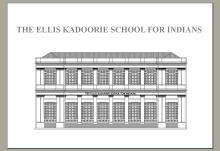The Report of the Director of Education for the year 1916 notes the opening of the school:
15. The Ellis Kadoorie School for Indians at So Kon Poo was opened on 16th October, 1916, by His Excellency the Governor. The building (presented to the Colony by Mr. Ellis Kadoorie) is very suitable and the playgrounds are, by the standards of the Colony, luxurious. An English Master has been appointed. The school is at present a feeder to Queen's College, but may possibly develop an Upper School of its own.
The 'History' page from the Sir Ellis Kadoorie Primary School website:
The school was found in 1891 by Ellis Kadoorie, an Indian Jewish who was knighted in 1917. ((David: I'm not sure that is true. They may be referring to The Ellis Kadoorie School in Sai Ying Pun, which took Chinese students.))
The school was originally called 'The Ellis Kadoorie School for Indians'. It was the first school in Hong Kong where Hindi and Urdu languages were included in the school curriculum.
During the Second World War, the school was closed like many schools in Hong Kong. After the war, Ellis Kadoorie School was re-opened in 1946 with AM (English) and PM (Chinese) sessions. In 1960, the school was renamed as Sir Ellis Kadoorie School. The P.M. session was closed in 1975 and the school commenced operating as a whole day school. The school was extended to Form Five in 1978.
In 1980 it was separated into Primary and Secondary and the majority of the primary graduates were promoted to Sir Ellis Kadoorie Secondary School. Due to the increased demand for more places in both Primary and Secondary, the Secondary School was moved to West Kowloon in 2000. The Primary School has occupied the whole school premises since then.



Comments
The school was purpose built and donated to the Government by Sir Ellis Kadoorie.
See www.hkmemory.hk/collections/education/All_Items/Images/201402/t20140207…
The Opening Ceremony at the Ellis Kadoorie School for Indians
A new Anglo-Indian School was opened by the Governor Henry May on 16 October 1916. The building was erected in Soo-Kun-Po Valley. During the ceremony, the Governor presented a speech which depicted briefly on the previous condition of Indian students in Hong Kong.
PHOTOS: http://www.hkmemory.hk/search/search?searchword=Ellis+Kadoorie+School+f…
"The seed of the present schools sprang from the Belilios Public School where the number of Indian boys under 11 years of age had, by 1903, increased to 9% of the total enrollment of the girls school. As much with a view to purge the Chinese girls school of this admixture of boys as desiring to benefit the boys themselves, a school was started for these Indian boys with the kind assistance of Mr. Arculli, who subscribed over $800 toward its cost. It was at first housed with a separate room at the Belilios Public School. In his annual report for 1904 the Director of Education wrote "properly developed it seems likely to prove a success and should be able to prepare a boy's for the upper school at Queens College it would be a logical and popular step if Urdu was made a subject in the Indian School. The school had then been put under the English school mistress Mrs.. Whitehead. In 1905 the school was moved into leased premises; an Indian and a Chinese Master were engaged, and Urdu was made a compulsory subject. The maximum enrollment that year was 44. In 1906 Mrs. Whitehead resigned and the school was moved to Prya East. These premises were reported in 1907 as "most unsuitable they are badly lighted and very noisy " In 1909 mr. Bishan Singh, who is still the senior Indian Master, took charge. By this time the average attendance had fallen to 227. the inspector reported "the grant of a free scholarship to Queens College tennable for 4 years has so far failed to attract more pupils" during this year's School flitted between the building at Causeway Bay known as Belilios Reformatory but flitted back to Prya East again, where it has styed ever since. 1911 the average attendance of increase to 50 in 1912 it was 58 which was the high-water mark. IN 1912 an extensively signed petition was made by the Indian Community for a better buildings than the Chinese tenement house which it has until now been held. It was not possible at that time to comply with their request in 1913 a branch school was started on the Kowloon side but it did not prove successful and was closed last year in 1914 mr. Kadoorie made the offer which led to the erection of the new building.